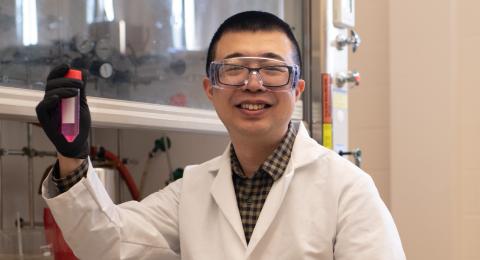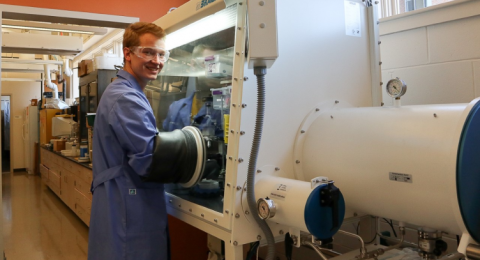The Ph.D. program in Chemistry equips students with the skills to become independent researchers, dedicated educators and innovative problem-solvers. You’ll conduct original research in cutting-edge laboratories with expert faculty. This program emphasizes hands-on learning, critical thinking, and scientific creativity. UNH’s personalized approach allows for personalized mentorship while offering opportunities for professional growth. Graduates excel in careers across academia, industry, and government, including roles in pharmaceuticals, chemical analysis, materials science, and instrumentation research and development.
Why get a doctoral degree in chemistry?
The Ph.D. program in chemistry is designed to train students as mature scientists capable of independent activity, i.e., conceiving a research problem, planning and carrying out the necessary experimental work, properly interpreting the results and advancing their knowledge by independent study. All students take coursework, carry out original research with a faculty mentor, have professional development opportunities and submit a dissertation.
Why study chemistry at UNH?
The Ph.D. program prepares students for careers in science as researchers and educators by expanding their knowledge of chemistry while developing their ability for critical analysis, creativity and independent study. You’ll find a program small enough to be personal but comprehensive enough to provide excellent opportunities for challenge and growth, like independent research, leadership, professional development and peer mentoring. You’ll engage in a program of study approved by the American Chemical Society that explores a dynamic, creative and practical discipline. You’ll have access to newly renovated laboratories, state-of-the-art equipment and faculty committed to transformative experiences for graduate students. Graduates are well placed for careers as professional chemists in industry, academia, government and related areas.
Potential career areas
- Agricultural and food products
- Biotechnology
- Chemical analysis and quality control
- Chemical/pharmaceutical sales and marketing
- Chemical research and development
- Chemistry professor
- Health professions
- Patent law, intellectual property, and science policy
- Pharmaceuticals and pharmacology
- Toxicology and forensic science
Curriculum & Requirements
The Ph.D. program prepares students for careers in science as researchers and educators by expanding their knowledge of chemistry while developing their ability for critical analysis, creativity, independent study and complex problem solving. Graduates are well positioned for careers as professional chemists in industry, academia, government, and related areas. All students take coursework, carry out original research with a faculty mentor, and submit a dissertation. The program has a focus on developing strong writing and oral communication skills. Financial support is available through either a teaching assistantship or research assistantship.
Ph.D. Degree Requirements
- Coursework: To be determined with the consent of the research advisor beyond the 1st. semester, a minimum of 6 courses is required including a minimum of 3 at the 900 level.
- Professional development courses required - 4 courses.
- Attendance at Department Seminars.
- Attendance at Graduate Research Update (GRU) sessions and presentation once annually from year two onward.
- Satisfactory presentation of a Thesis Research Proposal (TRP)
- Preparation and oral defense of an Original Research Proposal (ORP) in the third year of residence. Successful completion of the ORP enables the student to advance to candidacy.
- One oral presentation at a regional or technical conference, and one oral or poster presentation at the UNH Graduate Research Symposium.
- Preparation, public presentation, and oral defense of a written dissertation.
- Required 3.0 GPA or above to graduate.
Faculty Research Advisor and Dissertation Committee
Students select a research advisor during the first semester in the program after interviewing at least three faculty members. During each semester thereafter, students conduct independent research under the supervision of the Faculty Research Advisor. In the second year of residence and before the Thesis Research Proposal, a dissertation committee is selected. This committee evaluates the student's Thesis Research Proposal and the Original Research Proposal. Once the Original Research Proposal has been passed and the student advances to candidacy, a fifth committee member is selected and added to the Dissertation Committee to evaluate the Dissertation Defense.
| Code | Title | Credits |
|---|---|---|
| Professional Development Courses | ||
| CHEM 800 | Introduction to Chemistry Teaching and Research Practices | 1 |
| CHEM 801 | Modern Tools for Researchers in the Chemical Sciences | 1 |
| CHEM 802 | Critical Thinking for Chemists | 1 |
| CHEM 803 | Creative Thinking for Chemists | 1 |
| CHEM 992 | Graduate Writing Portfolio | 1 |
| Program Courses | ||
| CHEM 808 | Spectroscopic Investigations of Organic Molecules | 3 |
| CHEM 862 | Advanced Chemical Analysis Instrumentation | 3 |
| CHEM 840 | Chemical Biology | 3 |
| CHEM 855 | Advanced Organic Chemistry | 3 |
| CHEM 903 | Advanced Inorganic Chemistry I | 3 |
| CHEM 902 | Theoretical Organic Chemistry II | 3 |
| CHEM 904 | Advanced Inorganic Chemistry II | 3 |
| CHEM 911 | Synthetic Organic Chemistry I | 4 |
| CHEM 918 | Advanced Special Topics | 2-4 |
| CHEM 925 | Surface Chemistry | 3 |
| CHEM 927 | 3 | |
| CHEM 930 | Advanced Optical Methods | 3 |
| CHEM 934 | 3 | |
| CHEM 935 | Advanced Analytical Chemistry | 3 |
| CHEM 995 | Colloquium ( Courses options: A) Inorganic Chemistry; B) Organic Chemistry; C) Theoretical Organic Chemistry; D) Physical Chemistry; E) Analytical Chemistry; F) Chemical Education.) | 1-4 |
| MATH 835 | Statistical Methods for Research | 3 |
| Research | ||
| CHEM 999 | Doctoral Research | 0 |
Program Learning Outcomes
All Chemistry graduate students will be able to:
Display a comprehensive knowledge of chemistry, with greater depth demonstrated in at least one subdiscipline.
- Chemistry students in the Ph.D. and the M.S. program should have a basic knowledge of the field, with that knowledge being at least the level of the material taught in first-year chemistry and the initial courses in undergraduate sub-disciplinary classes (analytical, inorganic, organic, physical chemistry, and biochemistry).
Ph.D. students should demonstrate focused and deep expertise in their area of scholarly exploration, including an understanding of the current status of the topic. M.S. students should also demonstrate clear focus in scholarly pursuits.
- In the area of specialization, a Ph.D. student’s knowledge of the field should, at a minimum, be comparable to special topics classes at the graduate level.
- Students should demonstrate capabilities of searching the literature to become familiar with the current state of the field.
Apply critical thinking skills in the evaluation of scientific work, by analyzing, organizing, and evaluating scientific data and knowledge.
- Careful attention to and critical evaluation of material encountered in the literature, in seminars, and research activity is evidence of scientific maturation.
Generate hypotheses, design strategies, perform studies, and interpret results that lead to new knowledge in the field, including the…
- Application of central methods and techniques, including laboratory skills, statistical and computational methods, data gathering, and record-keeping to deliver detailed information and reproducible results.
- Demonstration of an understanding of the scientific method through the Original Research Proposal and through laboratory research (dissertation).
- Conduct of consequential scientific inquiry that advances a scientific field as required for a dissertation and peer-reviewed publications.
Communicate scientific information with effectiveness to both experts and novices in oral and written form, including methods, results, and conclusions.
- Demonstration of the ability to engage in communication appropriate for the audience.
- Present scientific material with clarity, accuracy, and precision.
Perform research in a professional, ethical, and safe manner.
- Students must participate in and apply knowledge from required training in laboratory safety and the responsible conduct of research; additional specialized training in these areas is encouraged.
- Students should develop skills in applicable professional areas, such as pedagogy, teamwork and team building, and leadership, through mentoring, instructional activity, and workshops.
- Safety and ethical behavior should be demonstrated in all activities, including both instructional and research activity.
Deadlines
Applications must be completed by the following deadlines in order to be reviewed for admission:
- Fall: Jan. 15 (for funding); April 1 (final)
- Spring: Dec. 1
- Summer: N/A
- Special: N/A
Application fee: $65
Campus: Durham
New England Regional: No
Accelerated Masters Eligible: No
New Hampshire Residents
Students claiming in-state residency must also submit a Proof of Residence Form. This form is not required to complete your application, but you will need to submit it after you are offered admission, or you will not be able to register for classes.
Transcripts
If you attended UNH or Granite State College (GSC) after September 1, 1991, and have indicated so on your online application, we will retrieve your transcript internally; this includes UNH-Durham, UNH-Manchester, UNH Non-Degree work and GSC.
If you did not attend UNH, or attended prior to September 1, 1991, then you must upload a copy (PDF) of your transcript in the application form. International transcripts must be translated into English.
If admitted, you must then request an official transcript be sent directly to our office from the Registrar's Office of each college/university attended. We accept transcripts both electronically and in hard copy:
- Electronic Transcripts: Please have your institution send the transcript directly to grad.school@unh.edu. Please note that we can only accept copies sent directly from the institution.
- Paper Transcripts: Please send hard copies of transcripts to: UNH Graduate School, Thompson Hall- 105 Main Street, Durham, NH 03824. You may request transcripts be sent to us directly from the institution or you may send them yourself as long as they remain sealed in the original university envelope.
Transcripts from all previous post-secondary institutions must be submitted and applicants must disclose any previous academic or disciplinary sanctions that resulted in their temporary or permanent separation from a previous post-secondary institution. If it is found that previous academic or disciplinary separations were not disclosed, applicants may face denial and admitted students may face dismissal from their academic program.
Letters of recommendation: 3 required
Recommendation letters submitted by relatives or friends, as well as letters older than one year, will not be accepted.
Personal Statement/Essay Questions
Prepare a brief but carefully crafted statement that includes: 1) Research experience. State the goals of your previous research and accomplishments to date. Including a list of publications, presentations, and awards within the Experience and Background section of the application is encouraged; however, please do not send actual publications or presentations. 2) A clear indication of your area of research interest(s). You may choose from analytical chemistry, inorganic chemistry, organic chemistry, or physical chemistry. Indicating more than one interest is perfectly acceptable. Provide a clear rationale as to why you wish to perform graduate work in these areas and include your immediate and long-range objectives. 3) Those UNH Chemistry faculty whose research interests you and why. 4) Additional information that will enhance the selection committee’s understanding of your personal background and life experiences, including educational (e.g. teaching and leadership experience), cultural, familial, or other opportunities or challenges.
Statements must be included with your submitted application.
Important Notes
All applicants are encouraged to contact programs directly to discuss program-specific application questions.
International Applicants
Prospective international students are required to submit TOEFL, IELTS, or equivalent examination scores. English Language Exams may be waived if English is your first language. If you wish to request a waiver, then please visit our Test Scores webpage for more information.
Explore Program Details
-
Associate Professor/Affiliate Assistant ProfessorEmail: John.Tsavalas@unh.eduPhone: (603) 862-2293























